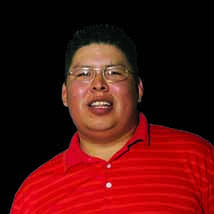Lethbridge College graduate Kevin Provost smiles as he watches the Zamboni slowly circle the  Civic Arena rink in preparation for another session of his annual summer hockey camp.
Civic Arena rink in preparation for another session of his annual summer hockey camp.
This is the first year that fully half of his students are of First Nations descent, and Kevin says that gives him the opportunity to address racial barriers and stereotypes.
“When we get together, we’re literally all on the same team,” he says. “It’s really cool.”
However, 30-year-old Piikani First Nations coach tells his story; it becomes evident that, ultimately, family and education constitute higher priorities than hockey. It hasn’t always been that way for him, though.
Kevin first attempted the Business Administration program at Lethbridge College in 1996, but admits he had no motivation and failed many of his courses.
“I would have much rather been playing hockey somewhere,” he explains.
After that initial experience, it took him five years before he tried again. The second attempt had a far different outcome: Kevin earned his General Studies and Business Administration certificates.
A natural leader, Kevin pursued the management stream, earning his diploma at the College before completing his Bachelor of Management degree through Athabasca University.
After struggling in high school and failing a grade in elementary school while on the reserve, success at the college level was a huge lift.
“To attain a postsecondary education was quite a huge accomplishment for me.”
Although Kevin spent his early years in Brocket, he left at 13 to pursue his hockey career, which took him through Saskatchewan and B.C., and briefly to Japan. These experiences allowed him to see opportunities that accrue to those with an education.
Kevin is one of six Lethbridge College grads serving as elected members of the Piikani tribal council.
“That speaks volumes for the programs the College offers.”
Kevin plans to begin his masters in management or administration soon. He says it is a lack of knowledge, combined with funding issues, that create the greatest barriers to the pursuit of higher learning among First Nations teens.
His aunt, who returned to school to complete her social work degree at 35, and then her masters, was another significant personal inspiration.
“It was sort of those role models that I looked up to in family members,” says Kevin, whose parents both passed away when he was a child.
Additionally, he was driven to provide a better life for his son Brayden, and decided a return to education was the best way to accomplish this. It was not easy, however. Finances and transportation were a problem, and Kevin admits working a part-time job and volunteering 30 hours per week as president of the Native club at Lethbridge College while taking care of his family was tricky.
Soon after graduating, Kevin returned to the reserve and put his skills to work, first by running a youth centre and later as an elected member of the band council.
“I guess really what I wanted to do with that education was give back to my community,” he says. Kevin tells of a saying among Piikani elders comparing modern education to the buffalo of their history.
“The buffalo used to provide for our people and they could get everything and anything from the buffalo,” explains Kevin.
“Those times are long gone, but you can get all these things through the use of your education.”


